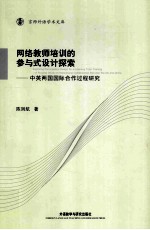图书介绍
网络教师培训的参与式设计探索 中英两国国际合作过程研究PDF|Epub|txt|kindle电子书版本网盘下载

- 陈则航著 著
- 出版社: 北京:外语教学与研究出版社
- ISBN:9787513504799
- 出版时间:2011
- 标注页数:390页
- 文件大小:51MB
- 文件页数:415页
- 主题词:计算机网络-应用-师资培训-研究-英文
PDF下载
下载说明
网络教师培训的参与式设计探索 中英两国国际合作过程研究PDF格式电子书版下载
下载的文件为RAR压缩包。需要使用解压软件进行解压得到PDF格式图书。建议使用BT下载工具Free Download Manager进行下载,简称FDM(免费,没有广告,支持多平台)。本站资源全部打包为BT种子。所以需要使用专业的BT下载软件进行下载。如BitComet qBittorrent uTorrent等BT下载工具。迅雷目前由于本站不是热门资源。不推荐使用!后期资源热门了。安装了迅雷也可以迅雷进行下载!
(文件页数 要大于 标注页数,上中下等多册电子书除外)
注意:本站所有压缩包均有解压码: 点击下载压缩包解压工具
图书目录
Chapter 1 Introduction1
1.1 ABOUT THE RESEARCH1
1.2 DISTANCE EDUCATION3
1.2.1 A brief history of distance education globally3
1.2.2 History of distance education in China5
1.2.3 Teachers and teacher training in distance education8
1.3 THE STUDY10
1.3.1 The context of the study10
1.3.2 The purpose of the study14
1.3.3 The significance of the study16
1.4 OVERVIEW OF THE BOOK17
Chapter 2 Literature Review18
2.1 INTRODUCTION18
2.2 PARTICIPATORY DESIGN19
2.2.1 Why PD?19
2.2.2 Challenges for PD21
2.2.3 Implementation of PD25
2.2.3.1 PD in software design25
2.2.3.2 PD in education27
2.2.3.3PD in e-learning29
2.2.4 Influential factors of PD32
2.2.4.1 Collaboration and cooperation in team work32
2.2.4.2Types of teams and team roles38
2.2.4.3 Team work strategies40
2.2.4.4 Culture and team work44
2.2.4.5 Intercultural communication competence and team work49
2.2.5 Summary53
2.3 E-TUTOR TRAINING54
2.3.1 e-Tutors as teachers54
2.3.1.1Theory basis for teacher education54
2.3.1.2Models in teacher edueation61
2.3.1.3Theories and models for teacher education in China64
2.3.1.4 Distance teacher education65
2.3.2 e-Tutors and e-learning68
2.3.2.1 e-Learning68
2.3.2.2 e-Learning design:process and pedagogy71
2.3.23 e-Learning in teacher education74
2.3.3 e-Tutor training76
2.3.3.1 Roles and competences of e-tutors76
233.2 e-Tutor training models and pedagogies79
2.3.4 Culture and pedagogy81
2.3.4.1 Authority and autonomy82
2.34.2 Harmony and critieality83
2.3.4.3 Collectivism and individualism84
2.4 THE THEORETICAL FRAMEWORK85
2.5 SUMMARY86
Chapter 3 Research Methodology88
3.1 INTRODUCTION88
3.2 CHOICE OF RESEARCH METHODOLOGY89
3.2.1 Theoretical paradigms89
3.2.2 Research approach91
3.3 RELIABILITY AND VALIDITY95
3.4 RESEARCH CONTEXT98
3.4.1 Phase 1 e-ELT Training Project—informing methodology98
3.4.2 Phase 2 e-Educator Training Project—the main study101
3.5 DISCUSSION OF MY ROLE103
3.6 RESEARCH DESIGN106
3.6.1 Research questions106
3.6.2 Subjects107
3.6.3 Research process108
3.6.4 Research instruments109
3.6.4.1Biographical information questionnaire109
3.6.4.2Interview109
3.6.4.3 Reflective journal112
3.6.4.4 Workshop audio recording113
3.6.4.5 EB Questionnaire114
3.6.5 Changes to the research design116
3.7 DATA ANALYSIS120
3.7.1 A brief history of AT121
3.7.2 Implementation of AT124
3.7.3 Use of AT in this study125
3.8 ETHICAL ISSUES126
3.9 SUMMARY AND CONCLUSION127
Chapter 4 Understanding the Context128
4.1 INTRODUCTION128
4.2 THE ORGANIZATION OF THE PROJECT131
4.2.1 Project structure131
4.2.2 Curriculum of the e-Educator training module132
4.2.3 Approach of participants collaboration135
4.2.4 Building and maintaining a community within the project team136
4.3 MEETING THE PARTICIPANTS137
4.3.1 The project team137
4.3.1.1 The UKU participants137
4.3.1.2 The ChUB participants139
4.3.1.3 Summary140
4.3.2 Theme groups141
4.3.2.1 Biographical/background information about participants in groups141
4.3.2.2 Motivation144
4.3.2.3 ICC145
4.3.2.4 Beliefs in teachingand learning153
4.3.2.5 EB175
4.3.2.6 Summary and prediction183
Chapter 5 The PD Process and the Influential Factors190
5.1 INTRODUCTION190
5.2 SUBJECT192
5.2.1 Expertise and status192
5.2.2 Motivation195
5.2.2.1 Personal motivation195
5.2.2.2 Professional motivation198
5.2.2.3 Demotivating factors200
5.2.3 Beliefs and approaches202
5.2.4 ICC205
5.2.4.1 Group A205
5.2.4.2 Group B206
5.2.4.3 Group D207
5.2.4.4 Group E209
5.2.5 Personality and culture209
5.3 INSTRUMENTS213
5.3.1 Asynchronous communication methods213
5.3.1.1 Email214
5.3.1.2 Discussion forum215
5.3.2 Synchronous communication methods216
5.3.3 Rapid prototyping methods218
5.4 OBJECT221
5.4.1 Understanding the project objectives221
5.4.2 Understanding the target users223
5.4.3 Understanding reason for being involved225
5.5 RULES226
5.5.1 Cultural/institutional norms226
5.5.2 Ground rules228
5.6 COMMUNITY231
5.6.1 Working mode232
5.6.2 Atmosphere237
5.6.3 Team work strategies240
5.6.3.1 Task completion241
5.6.3.2 Social aspect246
5.7 DIVISION OF LABOUR252
5.7.1 Defining roles252
5.7.2 Roles within groups253
5.7.3 Role of technologists256
5.8 SUMMARY AND FURTHER DISCUSSION260
5.8.1 Summary of predictions and actual performance260
5.8.2 Further discussion of AT framework266
5.9 CONCLUSION270
Chapter 6 e-Tutor Training Pedagogy from PD Process272
6.1 INTRODUCTION272
6.2 PROCESS AND OUTCOME OF GROUP DESIGN273
6.2.1 Designs as a result of similar beliefs in teaching and learning275
6.2.1.1 Design principle 1:Experiential learning275
6.2.1.2 Design principle 2:Reflective learning280
6.2.1.3 Design principle 3:Social constructivist approach283
6.2.1.4 Design principle 4:Personalized learning285
6.2.1.5 Design principle 5:Interactive and visual learning287
6.2.2 Designs as a result of negotiation of different beliefs291
6.2.2.1 Beliefs in teaching and learning and its influence291
6.2.2.2 EB and its influence309
6.2.3 Summary and discussion314
6.3 SUMMARY AND CONCLUSION318
Chapter 7 Conclusions319
7.1 INTRODUCTION319
7.2 SUMMARY OF MAJOR FINDINGS320
7.2.1 Influences on the PD process320
7.2.1.1 Rules322
7.2.1.2 Community326
7.2.2 About e-tutor training328
7.3 CONTRIBUTIONS OF THIS RESEARCH330
7.4 IMPLICATIONS FOR FUTURE USE OF PD FOR THE DEVELOPMENT OF E-LEARNING332
7.5 LIMITATIONS OF THE STUDY AND RECOMMENDATIONS FOR FUTURE RESEARCH337
7.5.1 Possible limitations in relation to research methodology337
7.5.2 Recommendations for further research340
7.6 CONCLUSION342
References344
Appendices371
Appendix 3.1 Biographical/Background Information371
Appendix 3.2 Interview Guide:Beliefs in Teaching and Learning373
Appendix 3.3 Epistemological Beliefs Questionnaire375
Appendix3.4 Reflective Journal Guide381
Appendix3.5 Group InterviewGuide383
Appendix3.6 Interviews with Technologists384
Appendix 3.7 Interviews with ChUB Coordinators385
Appendix 3.8 International Profiler Descriptor386
Appendix 4.1 Schedule for Workshop in March,2006389
Appendix4.2 Schedule for Workshop in August,2006390